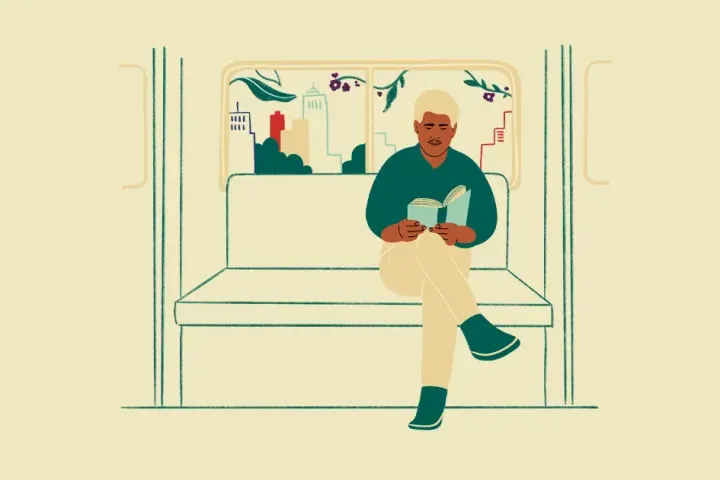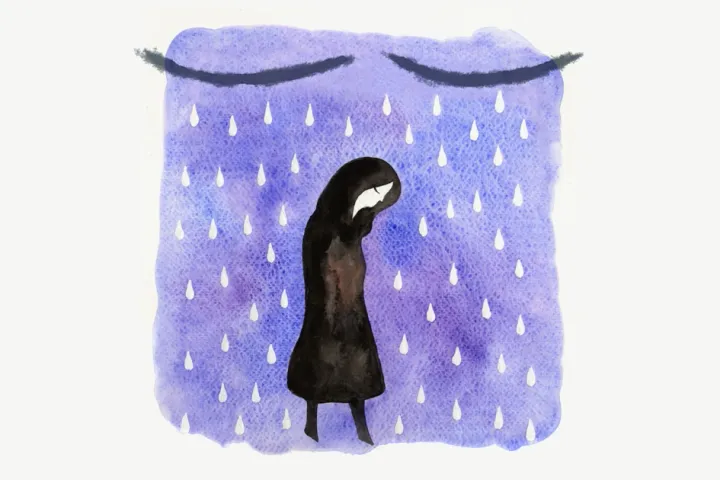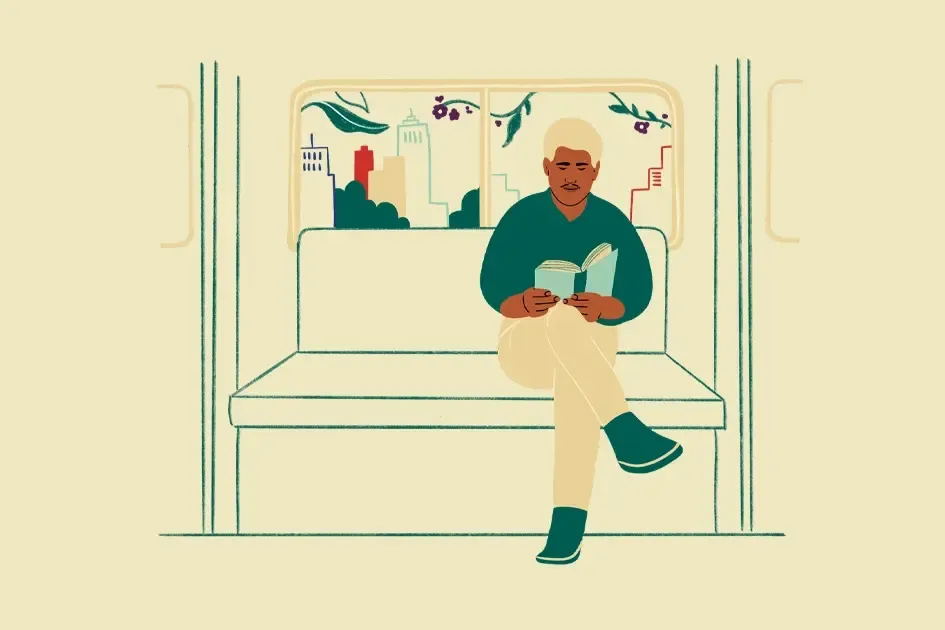In 2014, Russ Turner lay in a hammock under the Brazilian sky, wrestling with a problem. He’d spent the day leading a Bible seminar for 130 young people of the Ticuna, Cocama, and Mayoruna indigenous communities. He wanted to give each one a Messenger but had only 20 to distribute. “Lord,” he prayed, “these kids each need a Messenger to take back. But there’s no way—how can I multiply 20 like the bread and fishes?”

The next day Turner looked down at the river and saw four men unloading short rectangular boxes from their boat. He met them and discovered they were from In Touch Ministries, shooting a video for a translation project. In each box were 50 Messengers. Russ and the team lined the students up, and each one received a Messenger that day. “What a lack of faith on my part,” said Russ. “And what an answer to prayer.”
When stateside, Russ and Lynn Turner live outside Chattanooga in a rural bedroom community called Soddy-Daisy. Up their front steps and past the fresh paint on the porch posts are two rocking chairs facing the street. It looks like the home of a couple of empty-nesters discovering the joys of grandchildren. But once I’m inside, the talk quickly turns to South America and the various unsavory creatures Turner has dangled over in his sleep: snakes, roaches, scorpions, and a roomful of Amazon bamboo rats he kept at bay with a flashlight beam throughout the night.
The couple live in Tennessee less than half the year, keeping the house for someday when they can’t travel as often. Since 1978 Costa Rica has been their home. It’s where they’ve raised their family and, with prayer and perseverance, planted seven churches. As each church developed, Turner discipled a local man to take over, leaving the community debt-free and often with a building of their own. “I was always careful that I wouldn’t go into debt,” he said. “If God’s behind it, God will supply.” At home in San Ramón, Turner still pastors one of these churches, but he can often be found journeying south—by plane, bus, boat, car, or motorbike—to lead seminars in far-off places.

I’m with Turner a few weeks later on a double-ended ferry, cutting through the Gulf of Nicoya on our way to Deer Island in Costa Rica. He’s taking me to meet his friend Eladio, who pastors a church on an island of 900, where the men sleep through the day and fish by night. On the upper deck of the ferry, a young man named Randy keeps an eye on his parked niveladora as Magnificent Frigatebirds slice through the sky. What begins as a friendly conversation in English (mostly for my benefit) switches to Spanish as Turner and Randy dialog about the Bible. They talk of heaven, Christ, and finding peace with God. By the time the ferry ride is over, Randy prays to receive Christ. We wave goodbye as he climbs aboard his road grader with a new Messenger and drives off to join his work detail.
Eladio and Ipi live in a spacious open-air home. They have six grown children and 12 grandkids; the oldest, Priscilla, sweeps the floors and brings us coffee as Ipi grills fresh-caught red snapper for breakfast. Ipi tells Turner about her twin granddaughters, who share one Messenger between them. They take it to school each day, and the other children gather around to listen. Smiling, Turner retrieves another Messenger from his bag and places it on the table for the twins. “Now each can have her own.”
Two weeks ago the island hosted evangelistic services, and through them, six islanders were reconciled to God through Christ. The following Sunday an older woman named Doña Virginia was back in church with her three grown daughters. “That was a great blessing to my heart to see,” said Eladio, “because they had gotten away from the Lord. And then I saw two sisters who’d been at odds for years get up and hug each other.”

We walk the island together, and Turner reconnects with old friends even as he’s introduced to new ones. While we move along, Eladio indicates people he thinks should receive a Messenger. One of these is a man lying in a hammock, reading his Bible. He plays goalkeeper for one of the recreational fútbol teams on the island. Eladio rubs the man’s injured shoulder, and Turner crouches to show him how to navigate a Messenger. The man is excited to have something to listen to while he’s out fishing. Then we happen upon a young man with a thin shadow of a mustache and earbuds that dangle from his neck. Turner gives him a Messenger, and together they talk and pray. As he walks away, Eladio tells me the man’s wife has left him because he’s an alcoholic and can’t seem to get out of the gutter. “Keep praying for him,” Eladio says.
Turner is in line for breakfast in the Chiriquí province of Panama. He orders his eggs and sausage, and a young man compliments his Spanish. Turner explains that he is a pastor, on his way to host a seminar. “I’m happy someone’s preaching the gospel,” the young man tells him. Soon Turner is talking to the man’s girlfriend and her parents, giving them microSD cards with Messenger content for their cell phones. “I love having the SD card,” Turner tells me later, after handing out several others at a gas station where we refuel. “I like the expediency and convenience of just being able to give them out.”

After a little more traveling along the Pan-American Highway, we exit for a visit with one of Turner’s oldest friends from Costa Rica. Alex Taylor and his wife Mirto have made a home for 12 indigenous girls, all abandoned in some way. The youngest are 11-year-old twins the Taylors found living on their own in the mountains seven years ago. One was noticeably thinner than the other—the result of an ancient practice of starving and poisoning one unlucky twin. Today both are healthy and, along with the other girls, are getting an excellent education from the tutor who comes to the Taylors’ home each day.
Alex joins us in Turner’s Land Cruiser, and we follow a long ridge road through the mountains into areas set aside for the Ngäbe-Buglé people. Most homes are cobbled together from scraps of wood, bamboo, tin, even trash. But the government is building concrete houses for the families that live along the road, and a new washing machine set up under an awning represents the electricity many are getting for the first time. We climb higher and the clouds hang lower until they float like cotton candy.

Alex is training Ngäbe-Buglé pastors, who are reaching their people with the gospel after many years of works-based religion and cultic teachings. When we stop, Turner gives out Messengers to the people Alex has come to know, and we check on Aniceto—a blind pastor who needs a new Messenger because he’s worn out the buttons on his old one. Then we look in on Aniceto’s church, a half-covered patch of dirt, surrounded by knee-high cinder block. For seating, there are long plywood boards stretched from the top of the short wall to cinder blocks in the middle of the floor. Turner and Alex add up the resources they’ll need to finish a wall and put in a floor and some nice benches. They leave determined to help Aniceto have a better place to preach.
Six days into our trip, I wake to the sizzle and scrape of breakfast being made in the next room. We’re in the church guest house of a small village called Rio Indio, in the province of Colón, Panama. Turner serves pancakes to me and two American friends who’ve joined him to teach a weeklong seminar. One, Clip Suddeth, is a relatively new missionary to Panama, but his connections to Russ run deep. And the other, John Webb, was a teenager when he first met Russ, on a mission trip to Costa Rica—an experience God used to call him into ministry.
I step outside, and Turner is already engaged with Fidela, a woman waiting for a bus. A teacher who lost her job when the local school was closed, Fidela works the laundry room in a copper mine more than 12 hours away. Now absent from home 35 days at a time, she’s earning just half of her former wages. Before she boards the bus, we slip a Messenger into her hand to keep her company throughout the many days until her return. Turner’s seminars bring him into communities like these nine times over a period of three years, giving him the opportunity to develop lasting relationships with those he teaches. He tells me briefly of the challenges Fidela and her husband have overcome, and of the way the Lord has been conforming them into His image.

The teaching this week is focused on evangelism, missions, and church planting—a timely challenge for the believers in Rio Indio, who see their ranks shrinking. Many of the churches up and down the coast were planted by their pastor, Amado Leon, but after 39 years he can no longer keep up the pace of his younger self. The members of Iglesia Bautista Emaús realize this, and from the seminar, they’re embracing the idea that discipleship isn’t the work of the pastor alone. The attendees seem hungry to take on the challenge.
Lunch marks the end of the day’s session, and everyone shares a meal on the hillside by the guest house. Turner and his two friends go over the agenda for nearby Piña, where each evening the conference is repeated in still another village. He takes a moment to dream of the next several communities he’d like to reach, one in the province of Bocas del Toro. “You take the lead on that,” he tells Suddeth. “And I’ll assist you, like you’ve been assisting me.”
Then, after a nap in his hammock, Turner stands and stretches, his feet in a pair of Crocs that flap as he moves inside to the kitchen sink. There he stands, pushing yesterday’s clothes down into the water, balling them up, and squeezing to drain the water. He collects the wads of shirts and shorts and flaps back outside to hang them on the line where they’ll dry out for tomorrow. Turner, like Pastor Leon, has planted churches and shepherded believers for 40 years. Yet every day he seems as driven as the day before, longing to see men and women brought to Christ and discipled. “To see these people in heaven,” says Turner, “that will be just the greatest blessing to me.”
Photography by Johnathon Kelso





